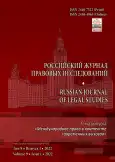Challenges of Ensuring the Jurisdiction of the Court of Justice of the European Union within the Brexit Process
- Authors: Galushko D.V.1
-
Affiliations:
- Financial University under the Government of the Russian Federation
- Issue: Vol 9, No 1 (2022)
- Pages: 15-21
- Section: Trending topic
- Submitted: 11.01.2022
- Accepted: 12.01.2022
- Published: 12.04.2022
- URL: https://journals.eco-vector.com/2410-7522/article/view/96218
- DOI: https://doi.org/10.17816/RJLS96218
- ID: 96218
Cite item
Abstract
The UK’s withdrawal from the European Union (EU), which is unprecedented and unique in the development of international integration processes, challenges the formalization of Brexit. The Brexit process was conditioned by the requirements of the EU legal order, including the need to ensure its basic principles. The Agreement on Britain’s withdrawal from the EU created the basis for regulating future relations between the parties, as well as the interaction of their legal orders. One of the most important aspects of Brexit is the jurisdiction of the EU Court of Justice. Based on the Withdrawal Agreement, the Court of Justice retained separate powers over the UK, despite the special dispute settlement mechanism, which can be considered a means to ensure the principle of the detachment of the EU legal order and the continuity of the Europeanization of the UK’s national legal order. However, the specified mechanism for the settlement of bilateral disputes in the context of the EU Court’s practice of observing the principle of detachment may complicate the implementation of the provisions of the Withdrawal Agreement, as well as in the future regulation of bilateral relations. In this article, well-known general and particular methods of scientific research are employed. This work aims to study the relevant problems of legal support for the UK’s secession from the EU, considering the observance of the principle of autonomy, to analyze the established dispute settlement mechanism between the UK and the EU in the context of the practice of the EU Court of Justice, as well as issues of enabling its jurisdiction regarding a third state.
Keywords
Full Text
About the authors
Dmitriy V. Galushko
Financial University under the Government of the Russian Federation
Author for correspondence.
Email: galushkodv@gmail.com
ORCID iD: 0000-0002-9301-9565
Scopus Author ID: 57219358969
Candidate of legal sciences, Associate Professor of the Department of legal regulation of economic activity
Russian Federation, MoscowReferences
- Armstrong K. (Br)Exit from the European Union — Control, Autonomy and the Evolution of EU Law. University of Cambridge Faculty of Law Legal Studies Research Paper Series. 2021; 13.
- Ispolinov AS. Principy avtonomnosti i prioriteta prava ES kak oruzhie Suda Evropejskogo sojuza v konflikte s investicionnymi arbitrazhami. Chast' 1. Delo Achmea. Rossijskij juridicheskij zhurnal. 2021;(2):56–77. (In Russ.).
- Lifshic IM. Mezhdunarodnoe finansovoe pravo i pravo Evropejskogo sojuza: vzaimodejstvie i vzaimovlijanie. Moscow: Justicinform; 2020. 548 p. (In Russ.).
- Halberstam D. It's the Autonomy, Stupid! A Modest Defense of Opinion 2/13 on EU Accession to the ECHR and the Way Forward. German Law Journal. 2015;16(1):105–146.
- Eeckhout P. Opinion 2/13 on EU Accession to the ECHR and Judicial Dialogue: Autonomy or Autarky. Fordham International Law Journal. 2015;(38):955–992.
- Riffel C. The CETA Opinion of the European Court of Justice and its Implications — Not that Selfish After All. Journal of International Economic Law. 2019;22(3):503–521.
- Fanou M. The CETA ICS and the Autonomy of the EU Legal Order in Opinion 1/17 — A Compass for the Future. Cambridge Yearbook of European Legal Studies. 2020;(22):106–132.
Supplementary files







